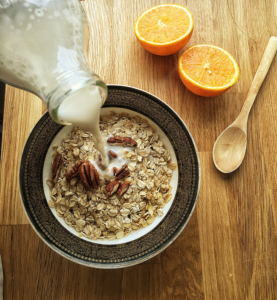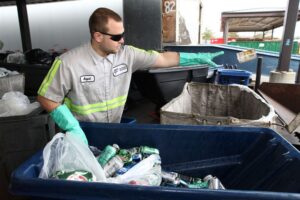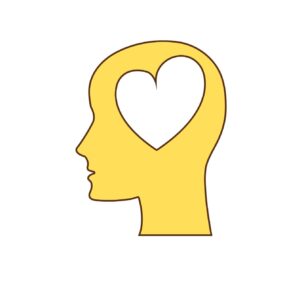This list offers a set of practices to get you (re)thinking about sustainability in the time of COVID-19. During these times of radical uncertainty, it is fine to reassess some of your previous green practices for your own health and the health of your loved ones and your community.
It’s important to acknowledge that living a green life doesn’t just mean thinking about the environment, it also means combating racism and supporting the Black Lives Matter movement. Racism is present everywhere, including in sustainability, and we must work to uproot it. Combating racism is not an add-on to sustainability; it is part of it. Therefore, we cannot strive for sustainability if we don’t address the violence that harms black and brown lives. As we traverse the unknown, our actions should be kind to ourselves, our communities, and our earth.
Recycling, Waste, and Single Use Plastic
To stay safe during this pandemic, many of us are using plastic gloves, masks, and wipes. This Personal Protective Equipment (PPE) is not recyclable, yet, it is ending up in the recycling stream. We must properly dispose of our PPE in the trash–not recycling–and inform those in our personal networks to do the same. Bring this issue up to your employer, your friends, and family: download an office poster here. Also, consider using a cloth face mask; they serve the same purpose as a single use mask but can be washed and reused. You can buy one from a store or make one from materials in your home.
Food and Nutrition
 During shelter-in-place, many of us are spending more time in the kitchen. Here are some tips to save money on groceries and eat a balanced diet:
During shelter-in-place, many of us are spending more time in the kitchen. Here are some tips to save money on groceries and eat a balanced diet:
- The Berkeley Farmers’ Markets are still open. Buying local keeps our carbon footprint smaller and the produce is fresh! If you receive CalFresh benefits, Market Match is available for your purchase.
- Consider a vegetable-based meal. Vegetables are often cheaper and have a smaller carbon footprint than meat. Pro-tip: go for frozen veggies, they have a longer shelf life.
- Get creative with staple pantry items. Did you know that oatmeal can be enjoyed as a sweet or savory dish? Add maple syrup for the sweet version or mix in garlic and veggies and top with an egg for a savory dish.
- Feeding a family is not easy. Here are some ideas on easy-to-prepare meals for your kids and information for breast-feeding moms
- If you need support to feed your family, the Berkeley Mutual Aid helps you locate food banks and pantries that give out weekly bags of groceries.
We must follow safety measures when buying groceries. If you’re a senior, you can shop during senior hours. There are often also special shopping times for people who are pregnant or have a compromised immune system. If you feel unsafe at the grocery store, Berkeley mutual aid can help you run errands.
Cleaning after your trip to the grocery store: Disinfect plastic bags, cans, and other objects following CDC guidelines. Follow your usual routine for rinsing your fruits and veggies with water but avoid using soap. If you’re cleaning roots and heartier vegetables, try a vegetable scrubber.
Need a break from cooking? Support local restaurants if you can. Check out this list of restaurants that are open for pick up/delivery and this list of Bay Area Black-owned restaurants. According to the CDC, there has been no evidence that coronavirus can spread through food, but we still need to be cautious of person-to-person contact. Contactless food delivery is the safest option but if you must pick up your order, keep your 6ft distance! When eating takeout, wash your hands with soap before and after touching food and food packaging.
Mental & Emotional Health
The COVID-19 pandemic has caused an increase in mental health issues. If you or someone you know is struggling with anxiety, depression, or fear and needs help, Berkeley Mutual Aid has a list of resources, including 24 hr crisis and suicide hotlines, as well as a guide for mental and emotional self-care. If you need to talk to someone, check out this resource guide for low fee and sliding scale therapy services in the Bay Area. The CDC also offers information on how to manage stress during the pandemic and how to help family members cope with their anxiety.
If you are a Kaiser Permanente member, you can download the Calm app at no cost, which provides help with sleep, meditation, and emotional resilience. YouTube videos on yoga, meditation, and sleep time stories are also available at no cost. Also, check with your local community group, school, place of worship, or health provider to see if they offer any mental health services.
Getting some time outside is also an important part of maintaining mental health. If possible, spend some time enjoying the outdoors, whether that means walking around your block, going to the park, or working in your garden.
Connecting with your friends and family can also boost mental health. Remember to check in on your loved ones and find creative ways to hangout that avoid putting anyone at risk.
We hope these tips have helped you. Stay safe and be well. Continue checking the CDC COVID-19 webpage for updates and resources.
Article authored by Yeymi Rivas, Heidi Nelson, Raj Fadadu, Susan Blachman, Alex Blumstein, and the Berkley Climate Action Coalition’s Environmental Health Working Group






